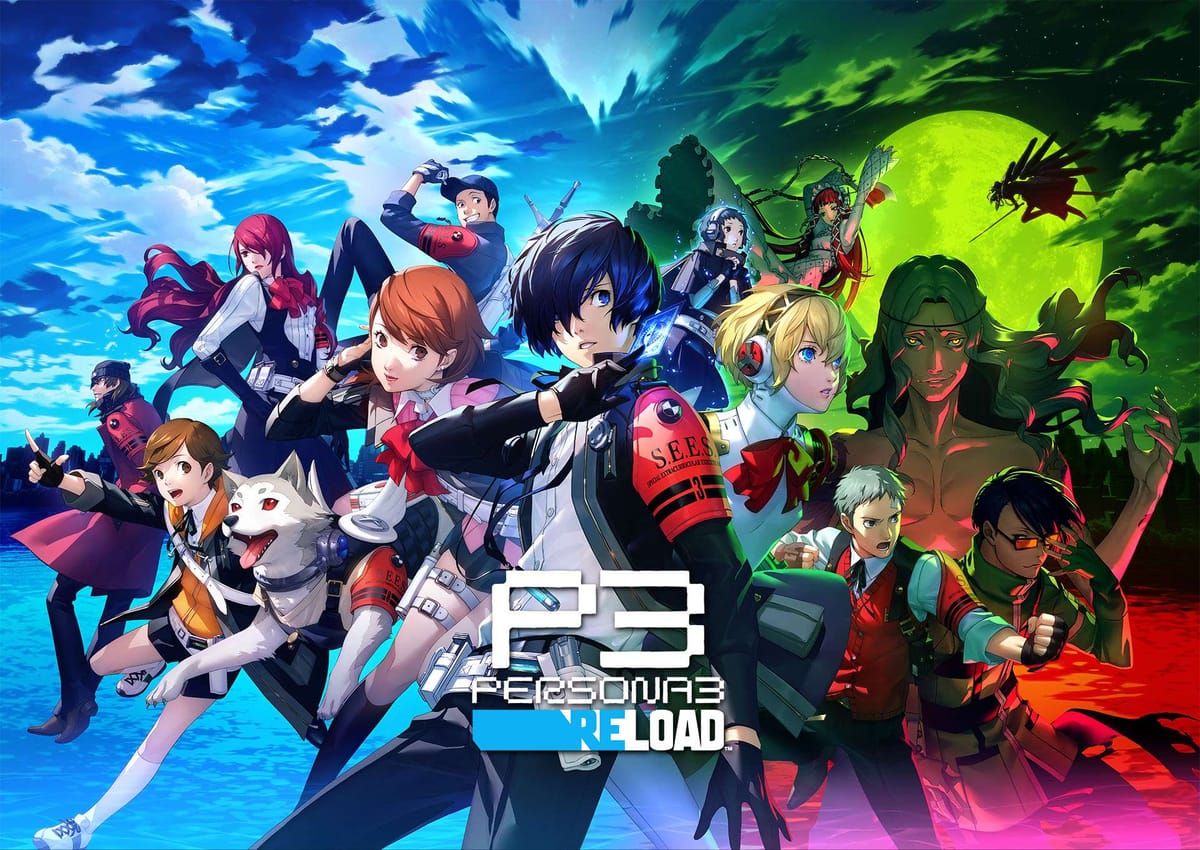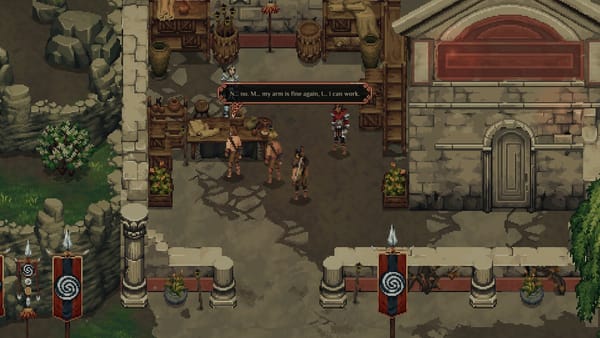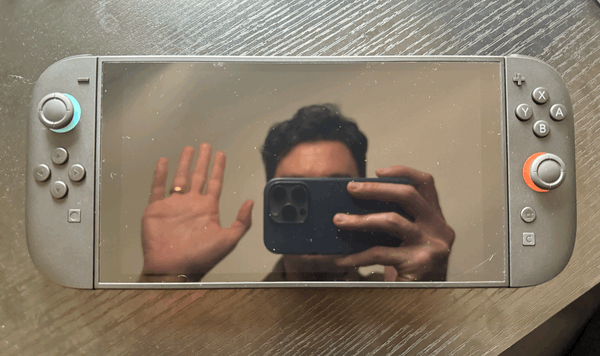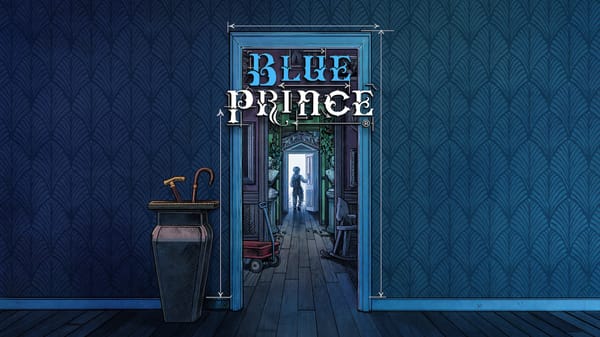Personas 3 and the liminal space of possibility
Guest Backlog by Alex Galka

It’s summer 2010, I have just finished my freshman year of college, and for the first time ever, I have tits.
I was not on HRT, or even a late bloomer, really. Puberty hit the same time it hit most of us, and it came with the mood swings, the unwelcome moisture, the odors. But for whatever reason, my tits came much later, and they came all at once: I grew eight cup sizes in one academic year. Like a college scholarship, I was suddenly endowed.
This development was, for a budding (ha ha) nonbinary person, distressing. So many of us wish to exist in a liminal space of possibility, of the ability to play and move fluidly rather than be built into the concrete gulag of secondary sex characteristics. For some time, I had this ability to play. And then, very suddenly, I did not.
I was also playing Persona 3 FES. I want there to be something meaningful to say about this, but there isn’t really. Still, we remember the media we consume at crucial junctures in our lives, and Persona 3 FES was, for whatever reason, my companion at that time. And, honestly, I didn’t mind the company. It was so easy to fall into a setting where the connections and cues were so transparently outlined, and where gender hardly mattered—male is, as we know, the default in video games as it is in life, all being male until proven guilty in Gamerlandia.
Playing Persona 3 for the first time, it was not about being a boy, or being a not-boy, or being a girl, so much as it was about the comfort of being a stock idea, off the shelf without major qualifications. Brand name gender seemed better than homemade. Even though Minato Arisato[1] came assembled XY out of the box, and the pronouns throughout the story are a casually thoughtless dash of he/him, there’s something beautifully anonymous in the ability to roleplay within the intimate lives of Gekkoukan’s residents. Even in romantic social links, Minato’s gender presentation hardly matters: it’s your choices of empathy versus callousness that drive the engine of the game, both in its under-the-hood calculations as well as the player’s phenomenological takeaways.
It is, in a way, reminiscent of forum-based internet roleplaying— something else, it is worth nothing, that I was doing quite a lot of at the time—in that your collaborations with other people grow to an emotional tipping point before either transforming alchemically into a new metal or shutting off entirely when you forget to check in with your scene partner. This is a stark difference from party-character sidequests in games like Dragon Age, where player responses matter more for unlocking particular dialogue or romancing options and less for building a relationship with another character via helping them with a personal problem that becomes, ultimately, an unbreakable bond. Both are mechanical elements, but something feels more genuine, and less pointedly gendered, when helping an old couple who run the bookstore in town mourn the death of their son. It is simultaneously a carte blanche for the player’s human–shaped pixel suit and also an incredibly human-feeling set of interactions. Were it only so easy in the unscripted world!
Perhaps, though, the feeling of neutrality despite he/him being thrown at you from every character is itself indicative of my own trans-whatever identity. It’s easier, in its own way, to shut out the slightly-wrong-but-with-choice than the definitely-wrong-assigned-at-birth. Regardless of the root cause, accepting a default and falling into it was and is an easier decision than thinking about other possibilities. The liminal spaces are incredibly inviting when the binary is suffocating, the perpetual twilight of gender—or coming of age, or a changing politic, or any other identity question. And so, in that way, I could have been Master Chief, who is both incredibly masculine and also intentionally vague. I could have been Crash Bandicoot, since he’s a goddamn marsupial and doesn’t have to worry about his probably-more-than-two nipples hanging out. It wasn’t the brimming pubescent maleness of Minato Arisato so much as it was the clearly defined roles in a world that had real emotional weight to it; if anything, it was perhaps more about being then-undiagnosed autistic than it was about being trans. Gender assigned at birth is, for me, like the concept of being allergic to dogs: I love femininity, but if she/her gets thrown at me too many times, I start to get itchy and wheezy and can’t play fetch anymore. It’s a real drag.
Fast forward 13 years,[2] past a name change, a gender change, several conflicts with body and brain, and Persona 3 Portable is finally released on modern consoles. Even though I own it on the PSP, I’d never played it to the end, so while I knew about FemC, I was downright flabbergasted that I felt so strongly about subtle conversational differences as Kotone, for the main hook in P3P is that it does what no other mainline Persona game does by offering a female protagonist.
We’re all used to male protags. This isn’t, like, groundbreaking. It’s not a hot take. It’s not even a mild take. It’s a tepid take. And ultimately, the female protag route in P3P isn’t all that different from the male. It hits all the same beats, and even adds a few here and there. But although I feel pretty certain the social links this time around were written by a woman (the updated ones that exist in the male route are incredibly similar if not straight-up copypasta), something about them all seemed off, almost as though the writer didn’t know how women actually talk to each other. Worse yet, the way that I felt when the other characters used “she” to refer to my character felt pandering, forced, using-a-pronoun-on-purpose-to-prove-you’ve-gotten-it-right-and-deserve-a-gold-star in the same way that it did and sometimes still does when I remind people that my own pronoun is they (heaven forbid). The story was written originally with a boy in mind, and the changes in P3P do not go much further, mechanically, than a pronoun swap. In that way, it felt almost as though Kotone was trans, as though her classmates knew her past and her name and her body and all of the other invasive questions that run through people’s minds when they learn that your chromosomes don’t match your identity. Is that a boy with boobs? What does it pee out of?
It is, in a way, somewhere in between the FemShep/ManShep dichotomy, where the story is more or less exactly the same regardless of gender choice, and a character builder such as in Baldur’s Gate 3, where you really can be whoever the hell you want to be. Despite the overwhelming pinkification of the UI, of the dorm room, etc., there are nevertheless some subtler experiential differences of being Kotone having previously played as Minato.[3] While no digital package will have the same freedom of choice in action and story that a tabletop game with a flexible GM adhering to the Rule of Cool, there is a different phenomenological something-or-other about making the 90-odd-percent-same dialogue choices when perceived as a boy, versus perceived as a girl. I have never made a real attempt to “pass” as anything other than nonbinary AFAB, and so I cannot speak with accuracy to the difference of social perception when your gender is changed. What I can speak to, and what this pinkification reminds me of, is the experience of assertiveness being seen as “go-getter” from the male mouth but “an outright bitch”[4] from the female mouth. It is about the perception of gender, or gender-unlike roles, as much as it is about the words, the social link, or the story choices themselves. Mitsuru’s whole social link, for example, is more or less unchanged between the MC and the FeMC, but the idea of giving Kotone the keys to her motorcycle and saying “it’s like I have a younger sister” comes off as so incredibly Queer in a way that it absolutely does not when you’re playing as Minato, even though Kotone’s social link necessarily ends in “friendship” over “romance.”[5] In this instance, the experience turns into straight-up Queer coding, and that’s with negligible changes otherwise.
Aaaanyway, at the same time that I was finishing up my playthrough of P3P this past winter and kvetching about the aforementioned Mitsuru Debacle™, I went to an appointment that had been on my calendar so long that I was 30 when I scheduled it and am 30 no longer: a consultation for transgender top surgery. The yeetening. The titsmageddon? I don’t know. Don’t get me wrong, I was excited to regain that play which I was so unconsciously agonizing over during my first playthrough of Persona 3, and which struck me with such palpable discomfort while playing P3P, but it came with a mourning of identity that I did not expect: that I was about to say hello to someone new, but goodbye to someone who I had tried to live with and make peace with for so long, but whose skin-clothes never truly fit.
Was, then, my discomfort with the treatment of Kotone not an indictment of strange writing choices, but rather an indictment of my own self? That it was not Kotone, or Minato, but Alex who felt discomfort with a feminine presentation, knowing the story as it has been written but never fleshing the beats out wholly? Was it that “she/her” is simply not correct, and its use for in-game pinkwashing stood out so jarringly because this is how it is in my daily, lived experience?
As the weeks passed and I continued progressing in the game, so too did the growing acceptance of my identity. It’s strange to say about something that I have been looking forward to for a very long time, but as I went through the familiar story with a different set of eyes, I almost want to say that I went through some of the grief stages. Bargaining (If I give you my tits, God, will you let me be happy in myself?), anger (Why can’t you just be happy with the body you have, ever, for any reason?), depression (Why must it feel so impossible to simply be without considering the surgical removal of seven pounds of flesh?), and finally acceptance (This is who I am, and I can’t pretend it isn’t any longer).
And then, as if all that wasn’t complicated enough, they went and released Persona 3 Reload on me, sending me back into Tartarus—as a boy, once again. Back to the default character, and this time, I have a flat chest, the default boob status. I’ll be the first to admit that playing P3P and going literally straight into P3R was a sort of “the end of Stephen King’s The Dark Tower saga wheel-of-ka” Sisyphean bullshit mirror, but hey, what is games writing if not that? Whether or not you suddenly feel “in the right body,” or “at home,” or whatever the positivity jargon is these days around getting gender-affirming surgery, for many of us, there truly is that period of loss. It’s not about chests (they’re still with me, if smaller, and more comfortable) or pronouns (I have never once missed she/her, although that still gets thrown at me on the reg, too) so much as it is about accessing community, or shared stories, or dysmorphic aesthetics of your body seeming one way but being another. Even if the skin suit is wrong, the experiences are real, and it is jarring for those to suddenly be in the proverbial rearview.
But as I booted up the game again, I was rebaptized into Arcana 0: The Fool, full of emptiness and, in its emptiness, full of limitless possibility. It is white light, containing all colors. Like Minato (or, as I chose for this playthrough, Makoto Yuki, in itself a new birth), I have a new means of playing with gender, with self, with identity, with clothes like the slutty mesh crop-top of my dreams, and default becomes a comfort once again not for its anonymity and its nothingness, but for its everythingness, whether an ideal presentation is Akihiko, Mitsuru, nowhere in between, everywhere in between, or the space that is no longer fraught with the connotations of liminality but has arrived at simply Being.
I will die on this hill. ↩︎
Or: an eighth grade of years ↩︎
Or Makoto, or Door-Kun, or … you know, one time, when I was playing Final Fantasy X, I decided to rename Tidus as “Nick Cool” because it was 2002 and that seemed like a good idea, and man, that was a weird, weird run of the game. Anyway, take your pick of protag names, because other characters call you by your pronouns only. ↩︎
Some linguistic liberties have been taken here, I’ll admit, but the point remains. ↩︎
Ridiculous, by the way. What Queer woman has not had the good old “I love you like a sister” that, in hindsight, was not a huge romantic crush? Who among us hasn’t daydreamed of being whisked into the sunset by a glorious motorcycle-riding girlfriend even once? ↩︎
About the author:
Alex Galka has odd ideas. They sometimes make things out of the odd ideas. They sometimes write about the odd ideas, too. They live in Queens.



